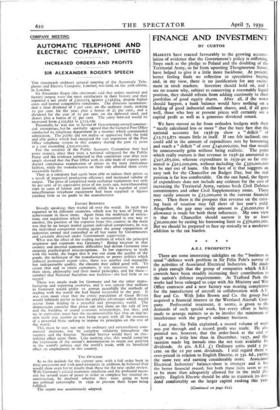COMPANY MEETING
AUTOMATIC TELEPHONE AND ELECTRIC COMPANY, LIMITED
INCREASED ORDERS AND PROFITS SIR ALEXANDER ROGER'S SPEECH
THE nineteenth ordinary general meeting of the Automatic Tele- phone and Electric Company, Limited, was held, on the 30th ultimo, in London.
Sir Alexander Rogcr (the chairman) said that orders received and factory output were the most satisfactory in their history and they reported a net profit of L202,074 against £148,624, despite higher costs and keener competitive conditions. The directors recommen- ded a final dividend of 7 per cent. on the ordinary stock, making to per cent. for the year, plus a bonus of 21 per cent., and a dividend for the year of so per cent. on the deferred stock and shares plus a bonus of 21 per cent. The carry forward would be increased from £105,632 to £153,159-
Personally, he was not in favour of Government-owned commer- . cial enterprises, but he cordially agreed that the General Post Office conducted its telephone department in a manner which commanded admiration. The public did not realise or appreciate fully the bold and able policy which had energised the vast expansion of the Post Office telephone system in this country during the past 15 years at a cost exceeding Lzoo,000,000.
For the scrutiny of the Public Accounts Committee they had every respect, since they were a national safeguard for the Public Purse and the evidence submitted to that committee year after year amply showed that the Post Office with its able body of experts con- ducted continuous examination of prices in the most meticulous fashion, while the manufacturers on their side afforded them every reasonable facility. They as a company had again been able to reduce their prices as a result of improved production efficiency and increased volume of output. The price of completed main exchange equipment was only 6o per cent. of its equivalent price of ten years ago, notwithstanding rises in costs of labour and material, while for a number of years miscellaneous telephone equipment had been supplied at figures yielding little or no profit to the manufacturer.
EXPORT BUSINESS
Broadly speaking, they traded all over the world. In 1938 they exported to 62 different countries, which was by way of being an achievement in these times. Apart from the multitude of restric- tions and regulations which had to be surmounted in one way or another, the position of the exporter from this country in the main was that he no longer traded against individual competitors; he was the individual competitor trading against the group competition of industries owned and controlled in all but name by Governments and certainly directed under Government supervision.
What was the effect of the trading methods of which the principal originator and exponent was Germany? Rising taxation in that country and internal economic difficulties had driven Germany into amazing psychological misconceptions. In her eagerness to trade with the world, she forgot that it was not alone the quality of the goods, the technique of the manufacturer, or power politics which induced permanent export sales; there was another and intangible but indispensable quality, the element they called good will. To create that and to retain customers, it was necessary to respect their ideas, philosophy and their moral principles, and for those— satisfied that National Socialism was faultless—she had little or no regard. 'There was ample trade for Germany and for the other manu- facturing and exporting countries, and it was certain that millions in Germany would prefer to pursue peacefully the methods of trading with the world she had found successful in the past. It was even more clear that the entire population of Great Britain would infinitely prefer to have the priceless advantages which would accrue from trading in a peaceful and prosperous world. The democracies consider that peace can rest alone on the rule of law and the building of sound economic relationships, but they, and we in particular, must face the incontrovertible fact that an irnp'ac- able trade war against us was being waged with all the resources of a powerful State seeking to impose its principles on the rest of the world.
This must be met, not only by ordinary and extraordinary com- mercial decisions, out by complete solidarity throughout the country and the Empire. National Service would have an elec- trifying effect upon them. Like nothing else, this would compete the impression of the nation's determination to retain our position in the world's politics and the world's trade, with its beneficial effect on employment in this country.
THE OUTLOOK
As to the outlook for the current year, with a full order book in their possession and with good prospects in addition, he believed they would show even berer results than those for the year under review. With Germany's critical economic condition and the profound neces- sity for several years of peace in order to complete her internal re- construction, he doubted whether they were going to have any political catastrophe in 1939 to prevent their hopes being fulfilled.
The report was unanimously adopted.










































 Previous page
Previous page